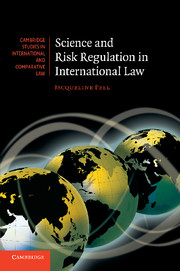Book contents
- Frontmatter
- Contents
- Preface
- Acknowledgements
- 1 Introduction: science and risk regulation in international law
- 2 Global risk governance and its legitimacy
- 3 Scientific rationality and risk in international law
- 4 Competing risk regulatory paradigms: sound science and the precautionary principle
- 5 Science and WTO regulation of SPS risk
- 6 Case studies of science and risk regulation in international law
- 7 Democratising global risk governance
- 8 What role for science in international risk regulation?
- Index
- CAMBRIDGE STUDIES IN INTERNATIONAL AND COMPARATIVE LAW
- References
2 - Global risk governance and its legitimacy
Published online by Cambridge University Press: 10 January 2011
- Frontmatter
- Contents
- Preface
- Acknowledgements
- 1 Introduction: science and risk regulation in international law
- 2 Global risk governance and its legitimacy
- 3 Scientific rationality and risk in international law
- 4 Competing risk regulatory paradigms: sound science and the precautionary principle
- 5 Science and WTO regulation of SPS risk
- 6 Case studies of science and risk regulation in international law
- 7 Democratising global risk governance
- 8 What role for science in international risk regulation?
- Index
- CAMBRIDGE STUDIES IN INTERNATIONAL AND COMPARATIVE LAW
- References
Summary
Introduction
One of the most debated topics in contemporary international law is the extent to which it constrains the regulatory autonomy of national governments. The interest that this issue presently attracts attests to the substantial changes that have taken place in international legal structures founded on the sovereignty of independent nation states. In a relatively short period of time, many issues traditionally conceived as ones of exclusively domestic concern – such as the health and safety of national populations and environmental protection – have come to be viewed as matters of global import, requiring systems of international regulation. The emergence of global risks, like that of climate change, as well as the processes of economic globalisation, have provided the impetus for the development of international rules that cover an increasingly wider range of activities and penetrate more deeply into national regulatory regimes.
Often the new constraints emerging at the international level do not take the form of specific obligations agreed by states in inter-governmental negotiation processes. Instead they may be the product of decisions taken about the implementation of ongoing multilateral regimes or supranational arrangements, which interpret the nature of governments' commitments or specify requisite modes of decision-making with implications both for the participating nation states and those that they govern. These developments raise the prospect that, in more and more cases, decisions traditionally taken in the domestic sphere will be subject to systems of global regulation and governance.
- Type
- Chapter
- Information
- Science and Risk Regulation in International Law , pp. 12 - 57Publisher: Cambridge University PressPrint publication year: 2010



